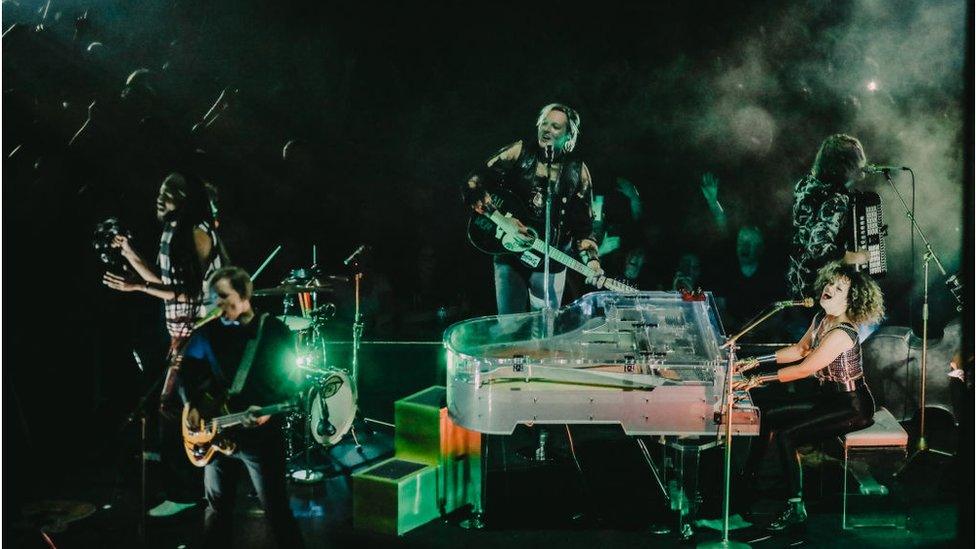Arcade Fire start world tour in Dublin after Win Butler abuse allegations
- Published

Win Butler has denied the accusations against him
Arcade Fire started their world tour in Dublin on Tuesday, days after the band's frontman Win Butler was accused of sexual misconduct.
At the weekend, a Pitchfork investigation, external found four people aged between 18 and 23 who accused the musician of behaving inappropriately.
The allegations ranged from sexual assault to unsolicited sexual text messages and forceful touching.
Butler has denied the allegations and said all encounters were consensual.
"I have never touched a woman against her will," he said in a statement to the music site. "It is deeply revisionist, and frankly just wrong, for anyone to suggest otherwise."
The Grammy Award winner, who is married to bandmate Régine Chassagne, cited past struggles with alcohol and depression, and said he was "very sorry to anyone who I have hurt with my behaviour".
The Pitchfork investigation covered 2015 to 2020, when Butler was aged between 34 and 39. All of his accusers were at least 10 years younger.
One, who spoke to Pitchfork under the pseudonym Lily and uses they/them pronouns, said they met the musician at a concert in 2015.
After the gig, Butler allegedly touched and kissed them in a car, without consent. On another occasion, Lily claimed that, after opening their front door to Butler, "he pinned me up against the wall and was aggressively grabbing my body and sticking his tongue down my throat".
Butler said he had touched Lily's thigh in the car and that the second interaction was "definitely mutual".
A woman given the pseudonym Stella said she started exchanging messages with Butler in 2016, when she was 18 and he was 36, and that she met him for a drink.
She said the singer later began "repeatedly sending her explicit texts without her consent or reciprocation" and she told him they were not wanted.
The singer acknowledged the sexting but said he did not realise the messages were not wanted. He said he did not recognise the significance of the age gap at the time but could now see "how it could be overwhelming".
Butler's wife told Pitchfork her husband "has never, and would never, touch a woman without her consent and I am certain he never did".
Radio boycott
The allegations prompted several radio stations in Canada, the band's home country, to stop playing their music.
A representative for CBC said the broadcaster would "pause" playing their songs "until we learn more about the situation". Meanwhile, Toronto's Indie88 made "a quick decision over the weekend to pull the band's music", program director Ian March told Ottowa City News, external.
He added that the station had "not yet had a fulsome internal conversation about the permanence of this decision".
The band did not address the allegations on stage in Dublin, where many fans appeared to be unaware of, or undeterred by, the controversy.
"There was really no sense of any of the news that had circled around the band," said Jason Carty, host of Beatles podcast Nothing Is Real, who attended the show.
"There was no booing or catcalling in the audience. To be honest, there wasn't the opportunity," he added, saying the "well-oiled" show had almost no pauses between songs.

About 14,000 people watched the opening night of the band's tour in Dublin
As they left the stage, the band played a snippet of Ben E King's Stand By Me, external, the only possible reference to Butler's situation.
However, some fans had earlier said they would boycott the gig. "Can't in good conscience go see Arcade Fire tonight in Dublin," wrote one fan on Twitter. "Music at its finest is a celebration of love, of joy, of heartache. Going to see them right now seems like a celebration of predatory behaviour."
Others outside the 3Arena in Dublin told the Irish Times, external they only had passing knowledge of the allegations.
"I read an article about it this morning. It's the first I've heard about it," said one. "If it's true it's very unfortunate and if it isn't, I'm sure it'll get cleared up at some point."
"I've never heard of them [the allegations] until now," added another. "But I think those things need to be taken very seriously because the band has a very socially conscious network and following.
"I would hope they do everything possible to find out the truth and I hope they can to get to the bottom of it."
Support act Feist donated the proceeds from her merchandise stand to the local chapter of Women's Aid.
The BBC has not been able to confirm whether this action was in direct response to Pitchfork's investigation.